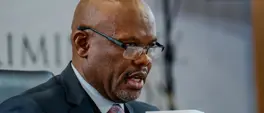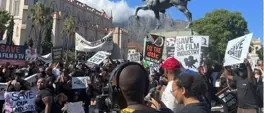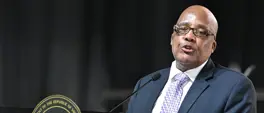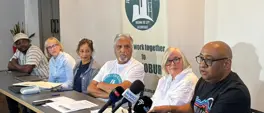Anti-zionism vs anti-semitism: Understanding the distinction
Sara-Jayne Makwala King
24 October 2024 | 5:13The two terms are often used interchangeably, but many argue they are not synonymous. So, what is the distinction?
Dr David Hirsh (London Centre for the Study of Contemporary Anti-semitism) and political scientist Professor Steven Friedman (University of Johannesburg) join Clement Manyathela.
Listen below.
ALSO READ: SA Jewish Board of Deputies dismisses Justice Minister's claims of no antisemitism in SA
Anti-Zionism and anti-Semitism are often conflated, but they are distinct concepts that need to be understood with care.
Anti-Zionism refers to opposition to the politics which supports the establishment and continued existence of the state of Israel.
Experts say while criticism of Israeli government policies can fall under anti-Zionism, such criticism must be carefully considered to avoid crossing into anti-Semitism.
Anti-Semitism is prejudice or discrimination against Jewish people in respect of their faith and ethnicity.
Hirsh says the issue is a complicated one, adding that there must be a distinction between a critical engagement with Israel and anti-semitism.
"I think that anti-Zionism sometimes becomes, it sometimes shifts from being a critical engagement with Israeli politics into becoming a kind of world view which puts Zionism and Israel at the centre of everything bad that happens in the world."
- Dr David Hirsh, London Centre for the Study of Contemporary Antisemitism
"When it does that, I think it tends to mirror some of the tropes and some of the ways of being of older anti-Semitic movements..."
- Dr David Hirsh, London Centre for the Study of Contemporary Antisemitism
Hirsh says often people support Palestinians in a way that fails to understand the history of anti-semitism.
"When people side with the anti-Semitism in Palestine, then they are in danger of embracing anti-Semitism. I think when people support Palestinians in an anti-Semitic way, then obviously they are in danger of embracing anti-Semitism."
- Dr David Hirsh, London Centre for the Study of Contemporary Antisemitism
Hirsh explains what supporting Palestinians in an anti-Semitic way might look like.
He gives the example of supporting Israel's enemies.
"I think it depends on which of Israel's enemies you take a side with... Hamas is quite explicit about its anti-Semitism. In its founding document it repeated all the old nonsense tropes of Nazi anti-Semitism... If you support that movement then I think you have a problem."
- Prof Steven Friedman, Political scientist - University of Johannesburg
The 1988 Hamas charter proclaims that jihad against Jews is required until Judgement Day.
However, in its rewritten charter of 2017, it claimed that Hamas's struggle was not against the Jewish people but against Zionists.
Friedman has written at length about anti-Semitism and is the author of the book Good Jew Bad Jew: Racism, anti-Semitism and the Assault on Meaning which explores the language around anti-Semitism in Israel.
He says the issue is similar to one South Africa experienced during Apartheid.
"One of the things the Apartheid government used to do was claim that anyone who wanted Apartheid gone hated Afrikaans people or hated white people. So, it you were a non-racialist... they tried to paint you as someone who hated white Afrikaners and we all know, of course, that that was ridiculous."
- Prof Steven Friedman, Political scientist - University of Johannesburg
Friedman says it is the same as the attempt to use anti-semitism to defend the Israeli state.
"You have people who regard the Israeli state as an Apartheid state... [and they] are smeared as antisemites, as people who hate Jews."
- Prof Steven Friedman, Political scientist - University of Johannesburg
"What antisemitism is, is very clear. Antisemitism is hatred of Jewish people."
- Prof Steven Friedman, Political scientist - University of Johannesburg
Zionism is a political belief, says Friedman.
"So, if you're against Zionism, it doesn't mean you're anti-Jewish."
- Prof Steven Friedman, Political scientist - University of Johannesburg
ALSO READ: CLEMENT MANYATHELA: Why are we quick to label to people who have different views to ours?
Scroll up to the audio player to listen to the full interview.
Get the whole picture 💡
Take a look at the topic timeline for all related articles.
Trending News
More in Local

18 February 2026 18:30
Hamilton Ndlovu's appeal attempt dismissed by high court

18 February 2026 16:45
Amber Lee Hughes says she believed killing Nada Jane Challita was attempt to save her from life of neglect

18 February 2026 16:30
Sibiya says some dockets investigated by PKTT remained untouched for years












